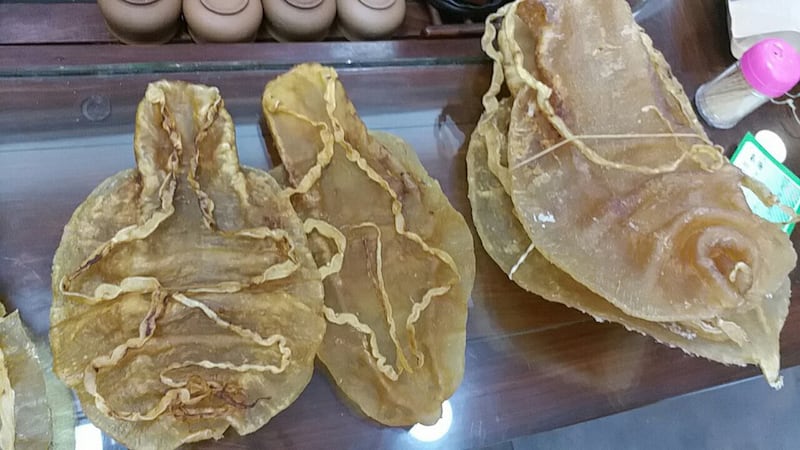Authorities in the democratic island of Taiwan recently arrested a man for smuggling fish parts used in traditional Chinese medicine (TCM) and health foods.
The man was caught with a haul of totoaba fish swim bladders -- the part of the fish that allows it to control the depth at which it swims.
Traditional restorative recipes have long called for fish parts, based on TCM principles, but fish parts were until recently sourced closer to home, along the south and eastern China seaboard.
But skyrocketing commercialization of TCM ingredients in recent decades effectively wiped out the yellow-lipped fish species that had once been caught in huge numbers in the East and South China Seas.
Now, smugglers and black marketeers are plying a roaring trade in the totoaba fish, which is found in the Gulf of California in Mexico.
Taiwan authorities, working with the U.S. Federal Bureau of Investigation (FBI), seized 19 kilograms of totoaba swim bladder in July and August, with an estimated black market value of U.S.$900,000, the island's Criminal Investigation Bureau (CIB) said.
The raid followed a tip-off to the CIB from the FBI that the fish would enter Taiwan en route to China using international express courier delivery.
The giant totoaba fish was added to the Convention on International Trade in Endangered Species of Wild Fauna and Flora (CITES) in 1976, making the trade in its parts illegal.
Nonetheless, smuggling continues, fueled by massive profits and high prices for totoaba swim bladders on the black market.
Chang Chih-wei, a researcher at the National Museum of Marine Biology and Aquarium in Taiwan, said what is happening to the totoaba has already befallen the yellow-lipped fish native to Chinese waters.
"In the 1950s and 1960s, yellow-lipped fish along the southeastern coast of China were caught in large numbers," Chang told RFA.
"Then catch numbers fell dramatically during the 1990s, to around one percent of hauls that were seen in the 1960s," he said.
"When the yellow-lipped fish was fished to the point of extinction, dealers turned to the totoaba as a replacement," Chang said.

Sales forced underground
Hall Sion Chan, project director at Greenpeace East Asia, said it is very rare to see swim bladders, also known as fish maw, offered for sale openly in Hong Kong, where authorities have been cracking down on the trade in recent years.
"There are almost no seafood stores that still sell them publicly, so they are being forced more and more underground," Chan told RFA. "Customs will seize them in smuggling cases from time to time."
She added: "Hong Kong is still a smuggling center [for fish parts]. They may not be sold in Hong Kong, but they are just re-exported to mainland China."
Demand for fish parts has remained buoyant even during the coronavirus pandemic.
In June 2020, Hong Kong Customs seized 160 kilograms of totoaba parts in the biggest haul to date.
Greenpeace has also investigated and exposed merchants selling the parts in Hong Kong.
Oceanographer Zhao Ning says totoaba populations have been devastated by the trade.
"It only lives in the Gulf of California, Mexico, and its swim bladder looks very similar to the yellow-lipped fish along the coast of China," Zhao said.
"It is said that it can stop bleeding and strengthen yang energy," he said. "To put it bluntly, it's basically protein."
Attempts to crack down
Zhao said the Chinese authorities have made some attempts to crack down on the trade, which is run by highly organized criminal gangs.
"In 2016, Guangzhou Customs asked me to take a class and teach them how to identify these parts," Zhao said. "They went on to crack a large number of smuggling cases."
He said public awareness of the issue is still next to non-existent, however.
"They don't care whether they are endangered or not endangered, as long as the fish maw is good and thick," Zhao said.
Chang said the craze for fish maw has led to its being sold to investors as a good place to earn a return on their cash.
The trend only accelerated the decline of totoaba populations.
"Totoaba can grow up to two meters long and weigh 100 kilograms," Chang said. "They live a very long time and grow slowly, only becoming sexually mature at around six or seven years. They only spawn once a year."
He added: "Adult fish live in relatively deep water habitats and reproduce in groups, so mixed catches in fishing areas can wipe out all of them."

Fishermen seize evidence
In 2015, the Greenpeace ship Hope cruised to Mexico to collect evidence of illegal fishing and remove nets.
"Some of our colleagues were there to take photos and video, and to remove nets," Greenpeace's Chan said. "But their evidence was seized by local fishermen."
"Any outsider who tries to get involved could be putting their life in danger," she said.
"The illegal fishing and smuggling industries are dominated by the criminal underworld," Chan said. "They control the location and number of fishing nets ... and even pay bribes to Mexican officials."
The nets used to catch totoaba have also been responsible for wiping out populations of a local dolphin species, the vaquita, Zhao Ning said.
"In 1997, there were more than 600 vaquita, but there were only an estimated six to 22 left this year," Zhao said. "It could end up extinct in 2021."
Chan said the issue won't go away unless governments take a more pro-active role in enforcing international regulations governing trade in endangered species under CITES.
"Hong Kong needs to step up investigation of underground black market networks, while China must forcefully suppress and curb trade [in fish parts]," Chan said.
"Mexico should put strict controls in place to cut off the sources [of the trade], such as banning the use of barbed nets," she said.
"This could be the last glimmer of hope for the totoaba and the vaquita."
Reported by Mai Xiaotian for RFA's Mandarin Service. Translated and edited by Luisetta Mudie.
